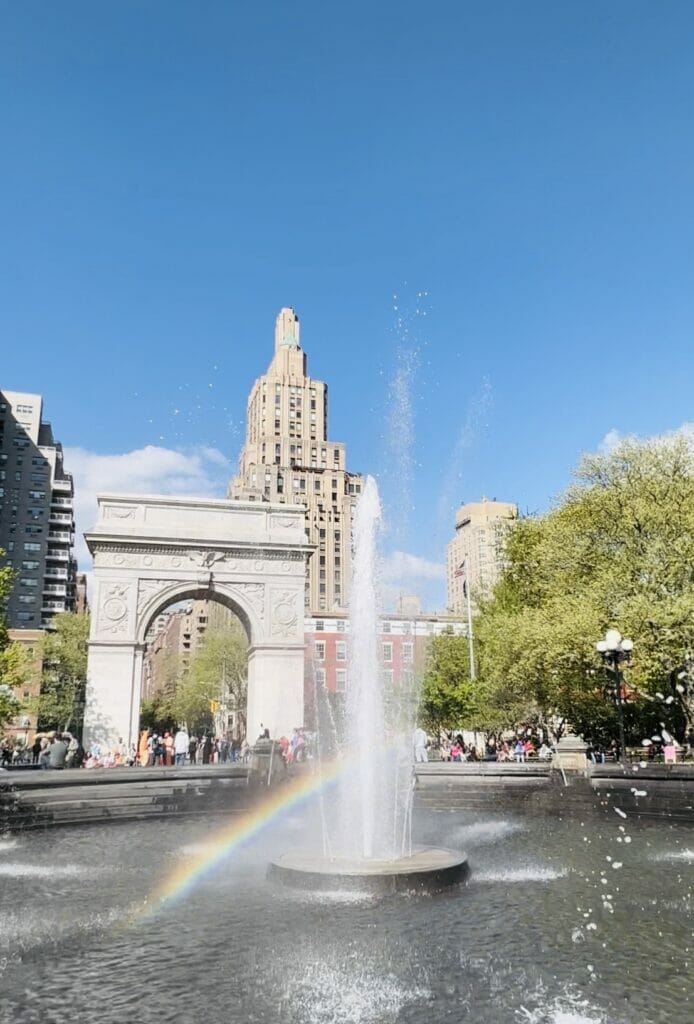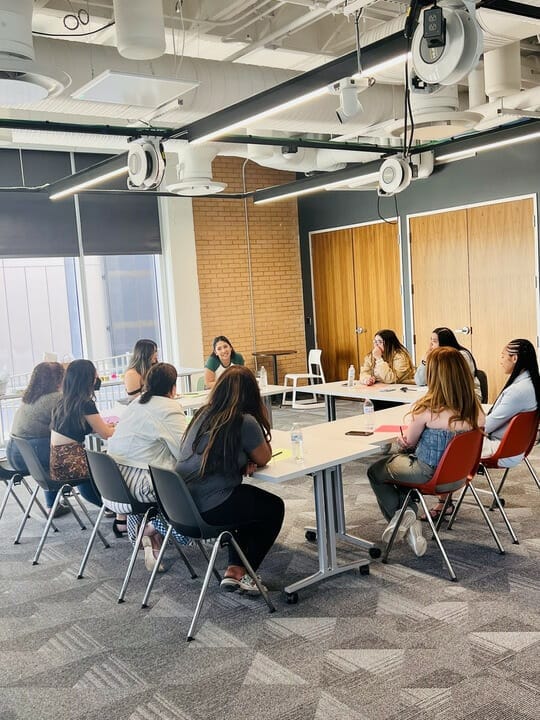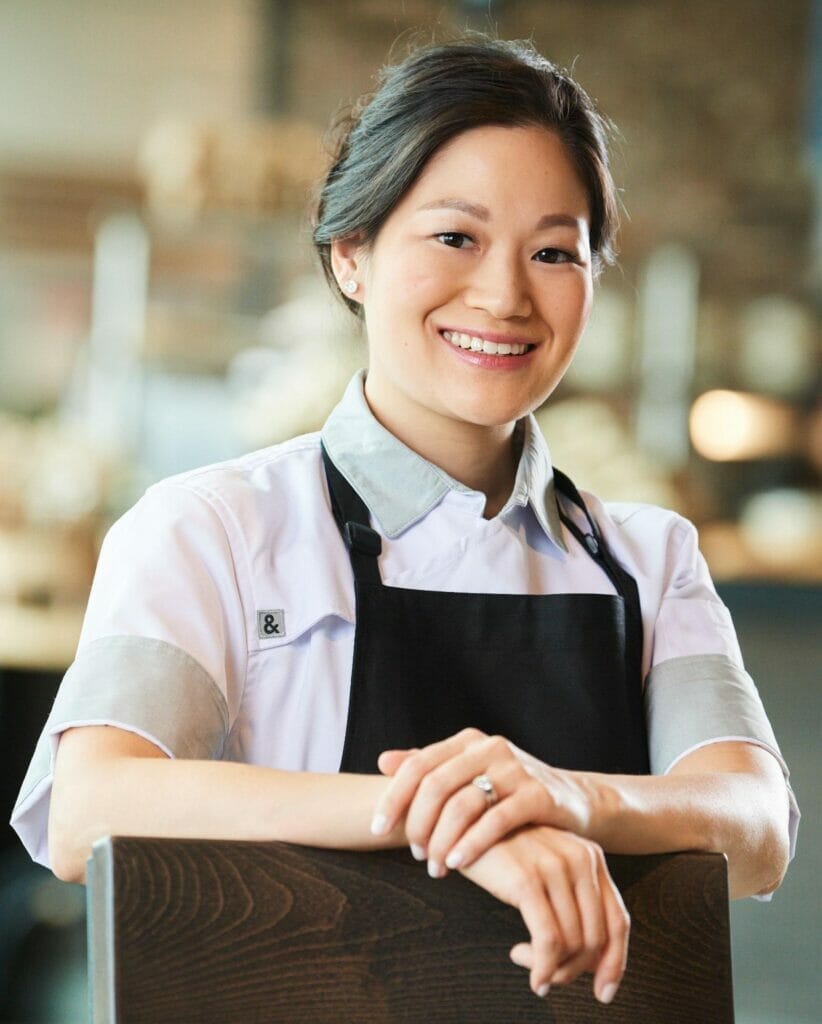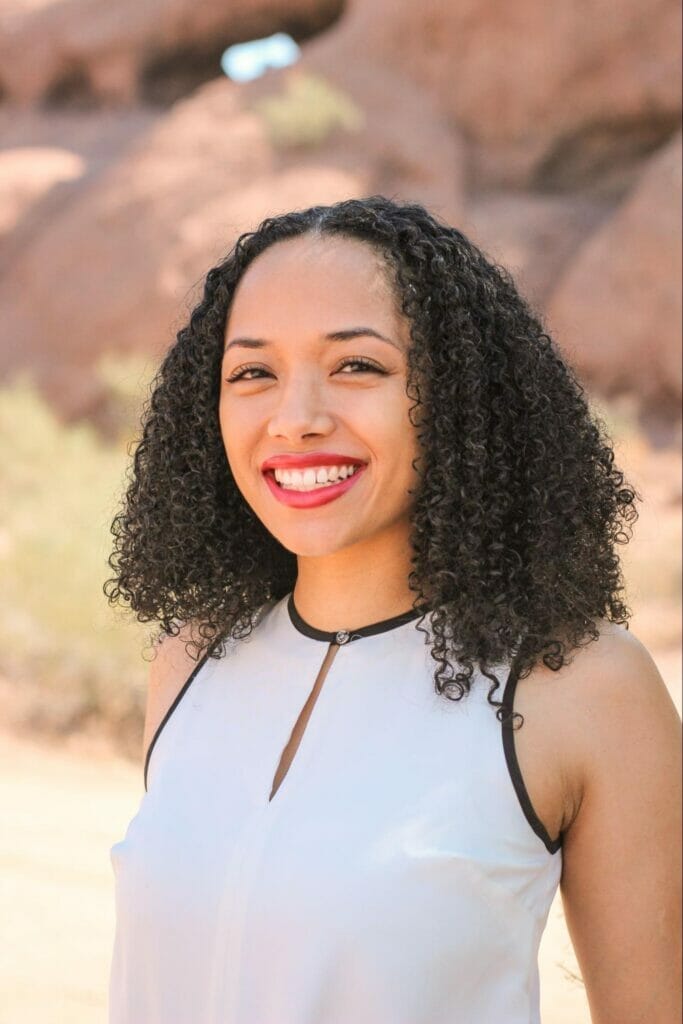Written by: Italia Caro, Vanessa Pablo-Jones, and Melissa Tung
Did you know that 72% of entrepreneurs reported experiencing mental health challenges according to research conducted in 2020 by the US National Institute of Mental Health? At the J. Orin Edson Entrepreneurship + Innovation Institute (Edson E+I), we empower all people through entrepreneurship and innovation to collaboratively build and sustain a more equitable future. Entrepreneurship is hard work, and it is important for entrepreneurs to prioritize their mental and physical health to truly sustain development while building a brighter future. There is a way to find success without sacrificing values, mental health, or relationships. During Asian American and Pacific Islander (AAPI) Heritage Month and Mental Health Awareness Month, we are proud to celebrate three inspiring AAPI women who have participated in our entrepreneurial programming who have demonstrated a commitment to both their entrepreneurial pursuits and their personal well-being. We hope their stories will inspire others to prioritize self-care on the entrepreneurial journey.
Italia:
I am a second-year journalism student at Walter Cronkite School of Journalism and Mass Communication at ASU. I’m Filipina, Asian Indian, and European (Welsh to be specific).
Given my ethnic background, there are two “codes” that my family adheres to: the first being family, the second being food. My family always has supported each other to the best of our abilities, I would not even be in journalism if it had not been for the love and support from my family. However, this support is rarely shown through words; it tends to be through food. My grandparents and my parents always make sure that I have eaten or ensure that I eat as much as possible. That is our way of taking care of each other: food.
I didn’t grow up with many well-known multiethnic women to look up to, so when ASU was hosting a Women’s History Month panel with Chef Grace Ramírez, Chef Melissa Tung, and Vanessa Pablo-Jones, I knew I wanted to go. The panel discussed their heritage and mental health, a discussion that I rarely experience.
The discussion around mental health has grown louder recently. It wasn’t discussed in my elementary or middle school. It was only in high school that it became a topic that more people discussed. However, I didn’t see very many Asian-Americans talking about mental health. As someone who has struggled with mental health, that was isolating.
Melissa:
Growing up in a Chinese-American household, we have strong family values and take care of one another. Mental health, however, was not often talked about. Feelings were sometimes suppressed or bottled up. Over the years, we have learned to find healthier, more effective ways to communicate and prioritize our mental health.
As a chef, I work in high-stress environments and have had to learn ways to decompress and stay positive and focused. My anxiety has increased over the past couple of years as my work has moved from longer-term, steady jobs to freelance consulting. I crave stability, so it has been an enormous physical, emotional, and financial challenge to persevere and trust myself and others in the process. I do not have it all figured out, but these are some steps I take to care for myself and my mental health:
Journaling: I find that releasing my feelings and goals on pen and paper (I am a millennial – I love writing things down!) is very therapeutic. It is a reference point to look back on and see how far I have come – to know which goals I met and which are still a work in progress, a physical record of my frustrations, joys, highs and lows. I can flip through the pages and take stock of my journey.

Spending time with loved ones: I have a wonderful husband who is my biggest supporter. He is also a chef, so he can relate to many professional struggles we go through. I also call my mom and sister often, catching up or venting, sharing moments of success, tribulations, and everything in between. I am grateful that my core group of friends – BFFs since childhood – truly know me, and being with them is where I feel most at ease. We have been through it all: elementary school, braces, boys, and travels around the world. I am proud of my family and friends for collectively improving communication skills and opening up about mental health. We offer each other a listening ear, advice, and encouragement.
Exercising: My work requires frequent travel, so it can be hard to have a routine, but I do yoga whenever I can. A few months ago I joined a gym, and I go every day when I am home. Most of my non-travel days are spent staring at screens, in meetings, on calls, and writing emails, so I prioritize this block of time each day when I turn off my phone and solely focus on taking care of my body and mind. Relatedly, going on walks: NYC is the best place to walk with a purpose or aimlessly! My husband and I take walks around Washington Square Park and along the Hudson River. We catch up, talk through professional challenges, clear our heads, and enjoy our neighborhood.

I encourage you to seek help if you need it – there is no shame in reaching out. The more we normalize it, the better we will all be. Take the steps that work for you to prioritize your mental health.
Vanessa:
Cultural Experience
I am a Black and Pacific Islander woman. My mother is CHamoru from the island of Guam in the Pacific, and I grew up on the island from ages 1 to 12 before moving back to the States. Guam is a U.S. territory located in the Pacific Ocean. In the CHamoru culture, we place extremely strong values on family and community. We are very close to our extended family members – not just grandparents, uncles, and aunties, but great-aunties, great-uncles, and 2nd and 3rd cousins. We come together in droves for celebrations and gatherings. We are taught to always respect our elders from a very young age. We support each other by doing helpful things for each other however we can and showing up whenever we can. All of these things provide a very strong sense of belonging, which undoubtedly contributes to positive mental health outcomes.
However, the historical impact of colonization, war on our lands, forced assimilation, and attempts to erase our culture have created intergenerational trauma. To add to that, cultural stigmas exist around mental health issues in our community. It can be seen as a personal weakness when someone seeks additional mental health support outside of the norm. Among these challenges, there is a growing movement towards breaking down stigmas and providing culturally relevant mental health resources for the CHamoru community.
My Mental Health Journey
At the beginning of 2020, I started to listen to guided meditations on the Shine app, and it quickly became a grounding habit for me. When the pandemic’s quarantine began in March, I was better prepared and even led a committee to launch a month of wellness activities to support my department’s staff during those uncertain times. After giving birth to my second child, I prioritized motherhood and let go of my meditation practice. I soon realized my mistake when I returned to work. Therapy helped me to become more aware of my needs and to develop coping strategies. I reconnected with my meditation practice and also accelerated my self-connection through journaling, positive affirmations, and joining a storytelling program through Unlock Your Story.
On my 29th birthday in 2022, I hosted my first event to connect with women about living our lives with intention. From there, Mindfulness with Ness was born. I began hosting daily 30 minute sessions of guided meditation, journaling, and conversation and later expanded to offer coaching, workshops, and consulting. Mindfulness with Ness’s purpose is to help feminine identifying BIPOC deepen their connection with themselves while prioritizing self-care.

Strategies I Use
In addition to guided meditation, journaling, and counseling/therapy, here are some other strategies I practice to maintain my mental health.
Alone time: Alone time can be hard to come by for me as a working mother and founder. I try to be intentional about having time alone to reconnect with myself by journaling, vlogging, or just napping.
Gratitude: As a part of the daily Mindfulness with Ness sessions, we reflect daily on what we are grateful for. Having a daily gratitude practice helps improve optimism, empathy, and overall life satisfaction. Each day, I like to write down at least 1 unique thing I am grateful for in regard to each of my household members, plus other gratitudes. When I’m feeling down, my list is longer and it helps improve my mood.
Intention: Another Mindfulness with Ness habit we do is to think about what we will do to feel good that day. For me, it’s usually some type of restful or joyful activity. I also have my vision board as my phone’s lock screen to constantly remind me of the intentions I’ve made.
Communities: I try to be intentional about the company I keep. I surround myself with people who bring me joy, inspiration, love, and peace such as with family, friends, and communities like Manifest House.
Consuming positive media: What we surround ourselves with matters– including the media and messages we hear. I try to consume more positive, feel-good, peaceful music. My husband is a DJ, and I love listening to his Peace playlist. I also love podcasts like Oprah’s Super Soul Conversations and Dreams In Drive.
About the Authors
Italia Caro is a third-year student of Walter Cronkite School of Journalism and Mass Communication at Arizona State University in downtown Phoenix. She is a member of Blaze Radio, a member of Asian-American Journalism Association, and a staff writer for Downtown Devil. She hopes to write and create multimedia stories about travel, culture and international communities in the future.
Twitter: @ItaliaCaro1

Chef Melissa Tung studied at the French Culinary Institute, then trained with Chef Thomas Keller at Bouchon Bakery. She quickly worked her way up the ranks to Executive Sous Chef at two premier NYC event venues, which led to her role as Executive Sous Chef at NYC’s iconic Tavern on the Green. A Private Chef role led to travels across the country and around the world, cooking for executives, presidents, dignitaries, and royalty. Food styling, culinary producing, and consulting followed, where she worked on television shows, advertising campaigns, cookbooks, and events.
When the Covid-19 pandemic hit, she joined World Central Kitchen to coordinate 9+ million meals to residents and frontline workers in NY/NJ. She and her colleagues were honored with numerous NYC Hero awards and commendations for their work throughout the pandemic. She was part of the Ukraine activation at the start of the war and continues to support WCK and various nonprofits such as the United Nations SDG2 Advocacy Hub, Chef’s Manifesto, and The Humans Who Feed Us. These experiences have reinforced that food has a deep social and humanitarian impact and paved the way for her involvement in socially conscious efforts related to food insecurity and sustainability.
@chefmelissatung

Vanessa Pablo-Jones is the Founder of Mindfulness With Ness, guiding BIPOC women to make a daily habit of caring for themselves. Influenced by her multicultural identity, education, work, and life, Vanessa’s purpose is to design experiences that empower historically marginalized communities to live fulfilling lives. She studied at Arizona State University, earning a Masters in Secondary Education, a Bachelors of Arts in Design Management, a Bachelors of Interdisciplinary Studies in Social Transformation Communication, and a certificate in Knowledge Entrepreneurship Innovation. Vanessa was a Teach For America corps member and ASU Success Coach. She is now the Program Manager of Venture Development with the J. Orin Edson Entrepreneurship + Innovation Institute.
@mindfulnesswithness

Resources for ASU Students


